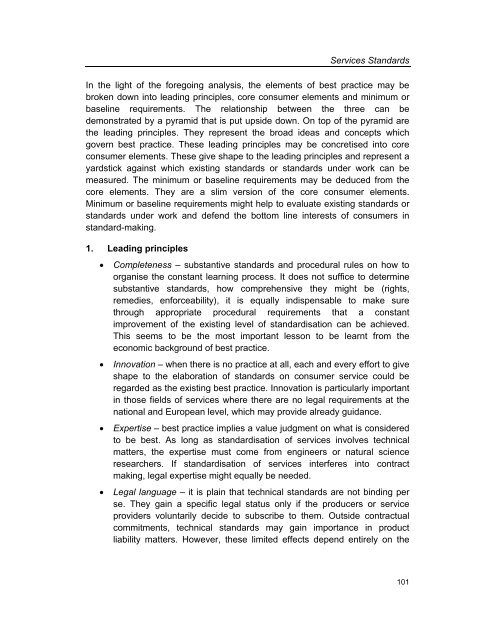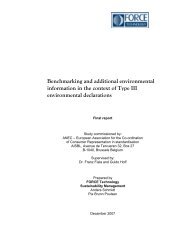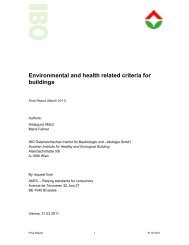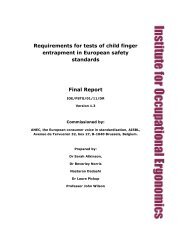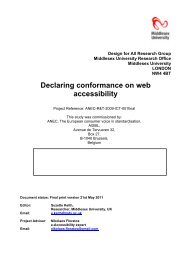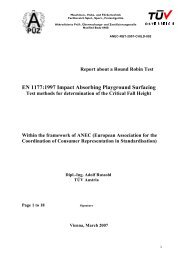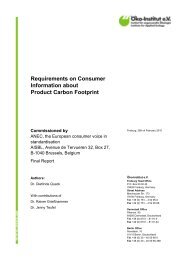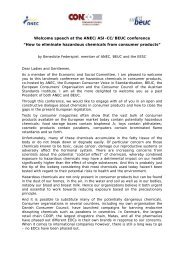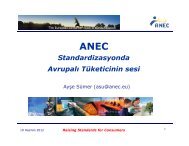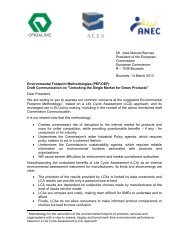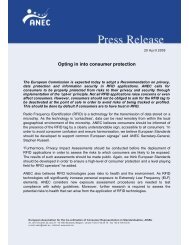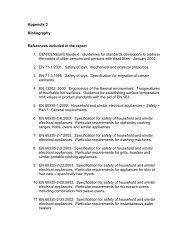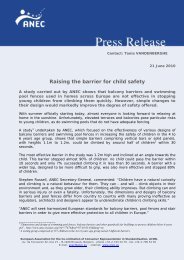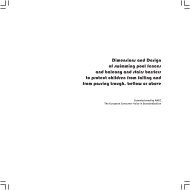Services Standards: Defining the Core Consumer Elements ... - ANEC
Services Standards: Defining the Core Consumer Elements ... - ANEC
Services Standards: Defining the Core Consumer Elements ... - ANEC
Create successful ePaper yourself
Turn your PDF publications into a flip-book with our unique Google optimized e-Paper software.
<strong>Services</strong> <strong>Standards</strong><br />
In <strong>the</strong> light of <strong>the</strong> foregoing analysis, <strong>the</strong> elements of best practice may be<br />
broken down into leading principles, core consumer elements and minimum or<br />
baseline requirements. The relationship between <strong>the</strong> three can be<br />
demonstrated by a pyramid that is put upside down. On top of <strong>the</strong> pyramid are<br />
<strong>the</strong> leading principles. They represent <strong>the</strong> broad ideas and concepts which<br />
govern best practice. These leading principles may be concretised into core<br />
consumer elements. These give shape to <strong>the</strong> leading principles and represent a<br />
yardstick against which existing standards or standards under work can be<br />
measured. The minimum or baseline requirements may be deduced from <strong>the</strong><br />
core elements. They are a slim version of <strong>the</strong> core consumer elements.<br />
Minimum or baseline requirements might help to evaluate existing standards or<br />
standards under work and defend <strong>the</strong> bottom line interests of consumers in<br />
standard-making.<br />
1. Leading principles<br />
• Completeness – substantive standards and procedural rules on how to<br />
organise <strong>the</strong> constant learning process. It does not suffice to determine<br />
substantive standards, how comprehensive <strong>the</strong>y might be (rights,<br />
remedies, enforceability), it is equally indispensable to make sure<br />
through appropriate procedural requirements that a constant<br />
improvement of <strong>the</strong> existing level of standardisation can be achieved.<br />
This seems to be <strong>the</strong> most important lesson to be learnt from <strong>the</strong><br />
economic background of best practice.<br />
• Innovation – when <strong>the</strong>re is no practice at all, each and every effort to give<br />
shape to <strong>the</strong> elaboration of standards on consumer service could be<br />
regarded as <strong>the</strong> existing best practice. Innovation is particularly important<br />
in those fields of services where <strong>the</strong>re are no legal requirements at <strong>the</strong><br />
national and European level, which may provide already guidance.<br />
• Expertise – best practice implies a value judgment on what is considered<br />
to be best. As long as standardisation of services involves technical<br />
matters, <strong>the</strong> expertise must come from engineers or natural science<br />
researchers. If standardisation of services interferes into contract<br />
making, legal expertise might equally be needed.<br />
• Legal language – it is plain that technical standards are not binding per<br />
se. They gain a specific legal status only if <strong>the</strong> producers or service<br />
providers voluntarily decide to subscribe to <strong>the</strong>m. Outside contractual<br />
commitments, technical standards may gain importance in product<br />
liability matters. However, <strong>the</strong>se limited effects depend entirely on <strong>the</strong><br />
101


